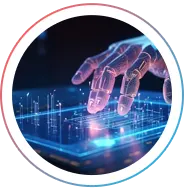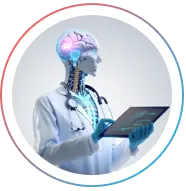
AI Services for Healthcare Industry
The Healthcare industry has undergone a massive transformation with the advent of AI services for healthcare. The algorithms built into this technology have revolutionized the way healthcare is delivered and managed. AI solutions for healthcare have changed the perspective that providing medical help is reactive support.













Today, the evolution of innovative concepts in AI like remote monitoring devices, analysis of patient data, MRI, CT scans and many more, helps in making it predictive. Healthcare professionals are now able to provide relevant care to prevent the disease rather than just using it. This is a significant leap in ensuring improved patient care.
AI for Healthcare Industry Benefits
AI for healthcare industry deliver several specialized advantages. These are singularly responsible for disrupting healthcare management so significantly.

Predictive Analytics using NLP
Natural language Processing (NLP) technology can be leveraged to extract valuable information from unstructured clinical notes and patient data. Healthcare professionals can use these inputs to predict outbreaks of diseases, patient admissions, and medication history, define treatment plans, and plan research documents.

Monitor Drug Safety Regulations
While AI can be credited with drug development as an important addition to the efficiency of delivering healthcare services, it does not merely stop there. AI is equally efficient at identifying adverse drug reactions and safety concerns by analyzing real-world data, leading to faster regulatory actions and patient safety.

Reduces Human Error
The precision and consistency of AI systems are some of its biggest advantages that can be leveraged to reduce human error in critical activities like administering medication and data entry.

Enhanced Efficiency
AI streamlines healthcare administrative processes reduces costs, and improves the overall efficiency of healthcare systems, including billing and claims processing.
AI Solutions for Healthcare are Shaping its Destiny
In a case study in India, the Generative AI solutions for healthcare was used to analyze patient data and suggest treatment plans. It achieved a concordance rate of 96% with expert oncologists, highlighting its potential to improve cancer care in regions with limited access to specialists. AI analyses patient data like genetic information, medical history, and real-time health metrics, to tailor treatments according to individual patient requirements. This helps to improve the outcomes and reduce side effects, if any. A leading technology enterprise leverages its AI system to assist healthcare professionals.
Discovery and Development
The analyses vast datasets and predicts potential drug candidates. It also helps in simulating drug interactions. This reduces the time and cost required to bring new medications to market.
Monitoring Health
Expanding healthcare to remote and underdeveloped regions is one of the biggest advantages of Artificial Intelligence solutions. AI-powered mobile apps and devices provide health monitoring and awareness services to spread access to good health.
AI for Pathology Analysis
An AI-powered platform has been designed for pathology analysis. In a case study with Massachusetts General Hospital, the algorithms built into the AI solution were used to review breast cancer biopsies. The AI system demonstrated high accuracy and helped pathologists reduce their workload without compromising on quality.
AI for Accurate Ultrasound Imaging
A handheld ultrasound device with built-in AI has been designed to enable health clinic workers to perform ultrasounds. It also can send images to a cloud-based AI system for interpretation. This technology has been used in emergencies and remote settings, enhancing access to diagnostic imaging.
We Provide AI Services for Healthcare Industry Across
Future of AI for Healthcare Industry
AI for healthcare industry is a big leap in data engineering. It has achieved great feats in ensuring that patient outcomes are greatly improved. Efficiency in healthcare administration and management is significantly increased. Access to quality healthcare is expanded even to underserved areas.
Having made such significant progress, AI services for healthcare intends to continue its steady pace of delivering quality and accessible healthcare well into the future. However, with the advancement of technology, AI will further evolve to power better and more efficient products. Some of its future trends can be seen in the following areas.

Genomics
AI for healthcare will play a significant role in genomics research. It will enable the development of more personalized medicine by analyzing genetic data and guiding treatment decisions.

Explainable AI (XAI)
The growing complexity of AI systems leads to more sophisticated healthcare products. It also leads to a rising need for transparency and accountability. Therefore, XAI focuses on making AI algorithms understandable and interpretable.

Ethics and Regulations
As AI becomes more deeply integrated into healthcare, there will be an increasing focus on ethical considerations, data privacy, and regulatory frameworks to ensure patient rights and data security.
AI Solutions for Healthcare Methodology by Aegis
At Aegis, we follow a proven methodology to develop AI solutions for healthcare that is divided into phases. All our activities and outputs that are delivered in each phase are aligned with your business objectives.

- Define the problem statement that you want the AI to address.
- Understand your challenges and analyze the available data.
- Define the scope of the project.
- Collect, clean, and preprocess data from the varied data sources identified earlier.
- If data is to be used for supervised learning annotate or label it with the correct outcomes or categories.
- Select, transform, and scale (if required) relevant features from the data that can help the AI model make appropriate predictions or classifications.
- Select the appropriate AI model or architecture.
- Use techniques like gradient descent and backpropagation to train the AI model on a section of the labeled data.
- Validate the model performance using the validation dataset.
- Implement safeguards to protect sensitive data and ensure compliance with data privacy regulations.
- Deploy the trained model into the target environment, such as a production server or cloud platform.
- Implement appropriate APIs for model integration.
- Monitor and track the model’s performance in real-world scenarios regularly.
- Update and optimize the model and infrastructure for scalability and efficiency, as required.
- Create comprehensive documentation for future reference.
Aegis Improved AI Services for Healthcare Capabilities
At Aegis, our team have extensive experience in the healthcare domain. Their vast exposure of AI for healthcare industry has helped them develop a thorough understanding and challenges faced by the domain. This helps them propose a unique solution that is purely based on experience and hence assures them of being highly effective.
Delivery Guarantee
Our efforts to serve our customers with full diligence have reaped their rightful rewards. We have successfully achieved a 100 % delivery guarantee in all our AI services for healthcare engagements garnering more happy and satisfied customers as we grow.
Understanding of AI Ethics
We have demonstrated a fair knowledge of ethical AI practices, including addressing bias, fairness, and transparency issues in AI models and data.
Strong AI Expertise
The team at Aegis possesses strong expertise in AI and machine learning development. It includes knowledge of various algorithms, deep learning frameworks, and data analysis techniques. We have demonstrated a thorough knowledge of techniques for explaining and interpreting AI model decisions. This is especially relevant in healthcare where model interpretability is critical.
From deep learning algorithms that can interpret computed tomography (CT) scans quicker than people (NLP) that can come across unprocessed information in electronic health records (EHRs), the possibilities of artificial intelligence in the healthcare industry seem to be almost limitless.
The use of Artificial Intelligence (AI) has recently gained thrust in different areas of the world, with the new drugs professional development as a noticeable benefactor. This highlights the important use of AI in many domains of the pharmacy industry, such as drug discovery and development, drug repurposing, improving drug efficiency, and leading clinical trials, amongst others.